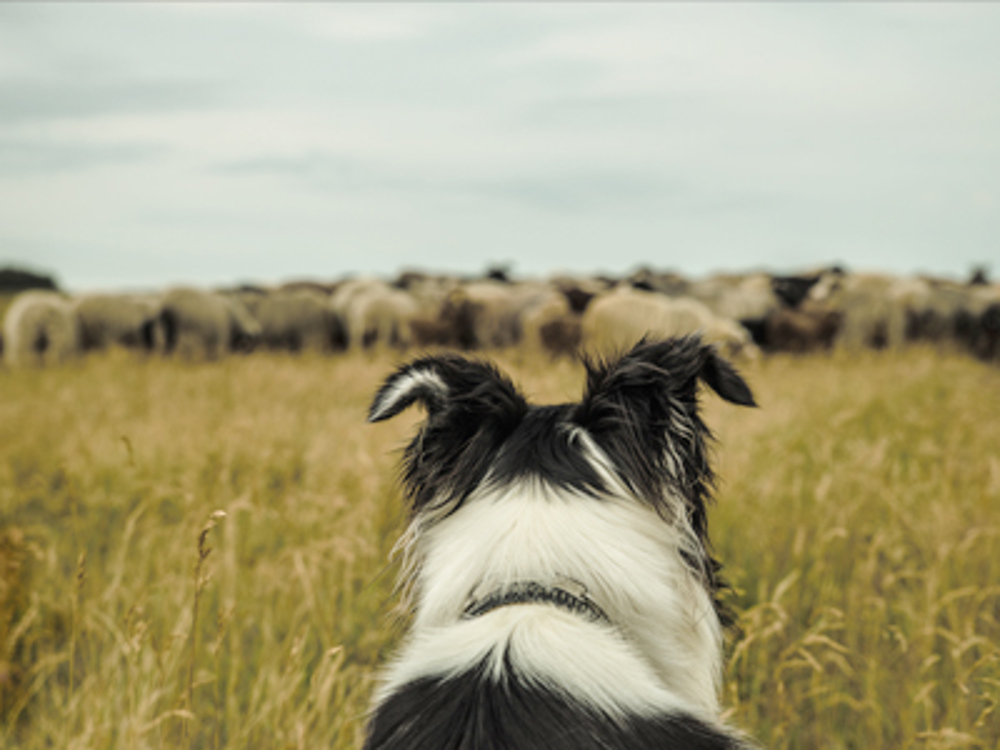
Livestock attacks under UK law covers attacking or chasing livestock. Legally, a dog must be on a lead or otherwise under close control in a field or enclosure in which there are sheep. The issue of dogs attacking or chasing livestock has a substantial financial and emotional impact on farmers.
The Kennel Club's view
Police statistics show around 7 in 10 incidents of dogs attacking or chasing livestock are caused by unaccompanied dogs, i.e. strays and owners allowing dogs to roam. For north Wales this rises to 89%.
Despite numbers of those visiting the countryside with dogs peaking in the summer months, and sheep numbers being around 70% higher in summer than winter, there appears to be no associated rise in attacks. Police statistics show no significant difference in the number of incidents reported between the six months of Mar-Aug and of those between Sep-Feb.
Overwhelmingly public messaging and media coverage of livestock attacks has focussed on keeping dogs on a lead around livestock. A recent NFU Mutual survey found that this message is succeeding, with 95% of dog walkers putting their dogs on a lead when seeing signs that livestock are present in a field.
However, it is imperative that the on-lead message is not taken too far. Whilst dogs should be kept on leads around livestock, they must also be able to be exercised off lead. Without sufficient off-lead exercise, dogs will likely be bored, have excess energy and be at a greater risk of straying.
The problem
Despite unaccompanied dogs being the largest cause of livestock attacks, there has been very little public information to tackle the impact of dogs escaping from home and/or being allowed to roam. This is also reflected in the recent NFU Mutual research, which reported that 52% are allowing their pets to go out in the garden unaccompanied when they're not at home, up from 43% last year.[1]
1. (NFU Mutual / Petbuzz Market Research January 2019).
The Kennel Club recommendations
All stakeholders need to improve their public messaging on unaccompanied dogs to increase awareness of risks posed by escaping and roaming dogs. It is essential that this includes how the media reports incidents of dogs attacking and chasing livestock. Local authorities must make greater use of acceptable behaviour contracts and community protection notices to the risk of reoccurrence of dogs escaping.
With regard to people out walking their dogs, it is clear from both the evidence gathered by the NFU Mutual and our experience, that dog owners want to avoid conflict. Landowners and farmers erecting clear, up-to-date signs about the presence of a livestock in fields will help to reduce incidents of dogs attacking and chasing livestock and reduce human fatalities arising from cattle. Indicating alternative livestock-free walking routes has also proven to be effective.[2]
2. (APGAW, Tackling livestock worrying and encouraging responsible dog ownership, November 2017).
How can you help?
With over 8 million dogs in the UK, the dog-owning population accounts for approximately 25% of the British public, meaning that dog-related issues can have widespread voting appeal.
The way to keep politicians interested in canine welfare is to speak to them about your concerns on a particular issue (e.g. dog walking access, dangerous dogs, puppy farming etc.) and ask for their help. You can do this via email, a letter or even a meeting.
The key is to keep their mailbags full with dog issues to ensure that as your elected representative, they keep up to date with the issues that are most important to you, their constituent.
Get involved
If there is an issue you feel strongly about, write a letter to your parliamentary representative lending your support to one of our many campaigns and letting them know how they can help. Your emails and letters don't need to be long, in fact, the shorter the better as politicians are very busy. By doing this you will be playing your part in keeping the welfare of dogs on the political agenda.
Walking your dog in the countryside
The Kennel Club and National Farmers' Union (NFU) have joined forces to make countryside dog walks safer and more stress free for you, your dogs and for farm animals.
Stay safe around farm animals and horses:
- Stop, look and listen before entering a field; be aware of any animals present
- Always keep your dog on a short lead
- Find the safest route around animals, giving them plenty of space and using paths or access land where possible
- Exit the area calmly and quickly if threatened, releasing your dog to make it easier for you both to reach safety
Check out our video on walking safely in the countryside and keep an eye out footpath signs which encourage responsible dog ownership, particularly when around livestock.
